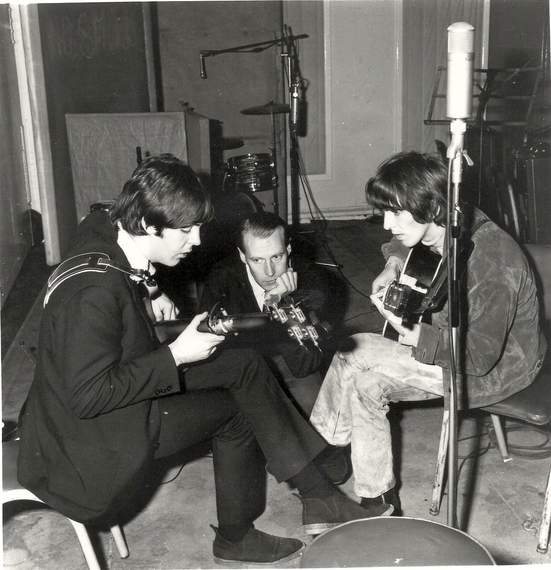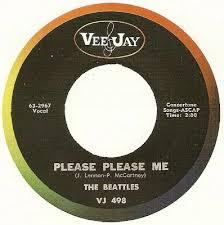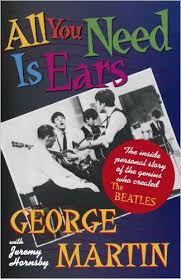As we say goodbye to George Martin, the producer who polished up all those Beatles songs and sent them out to dazzle the world, it's worth noting that part of his skill was also knowing when to let it be.
Martin, an elegant and delightful man who died Tuesday at the age of 90, is best known, and is being most remembered today, for the marvelous things he did with sound machines to shape songs like "Strawberry Fields Forever," "A Day In the Life" or the Abbey Road medley.
He took the Beatles' musical genius and helped elevate it into records that really did push rock 'n' roll further from its often raw and basic beginnings into a more sophisticated musical form. (Photo above released with the Beatles' Anthology album.)
The best of those records made us gasp. They made us stop and stare at the radio, or the turntable. We often overstate the impact of an artist or a record on subsequent popular culture, but in the case of the Beatles and George Martin, we do not.
Martin helped put "more" into rock 'n' roll. Just let's not forget he also understood "less."
For proof, we need only back up a couple of years to the first Beatles records, which are about as raw and basic as rock 'n' roll gets.
The first record Martin produced with the group was "Love Me Do," which was okay, but not quite there.
With the second, "Please Please Me," the Beatles took off on the flight from which they never came down.
The backstory with "Please Please Me" was that Martin wanted them to record "How Do You Do It." The Beatles said no, we've got "Please Please Me" and it's better.
They were right. Martin agreed. But he was right about something else. John Lennon and Paul McCartney originally conceived "Please Please Me" as a slow, Roy Orbison-style ballad. Martin wanted them to speed it up.
This true collaboration - he listened to them, they listened to him - created a record that, 53 years later, still explodes out of the radio. "Last night I said these words to my girl . . . . "
It's two minutes long, exactly two minutes. Nothing fancy there, just pure rock 'n' roll - and every bit as fresh as "Hey Jude."
Sometimes less is more.
Over the next couple of years Martin produced a gravity-defying string of great Beatles records, from "I Saw Her Standing There" to "I'll Cry Instead," "I Should Have Known Better," "Ticket To Ride" and the list goes on.
At some point, prodded by their own skill and the likes of Bob Dylan and Brian Wilson, the Beatles started wanting to get more ambitious. That played right into what Martin liked best, which was sophisticated music drawing on his classical and jazz background.
From the strings on "Yesterday" and the oddly hypnotic sounds on "Norwegian Wood," they leapt to "Strawberry Fields" and Sgt. Pepper, where months of studio craftsmanship created an album that ruled the popular music world in the summer of 1967.
No one would or should challenge the sonic achievement of Sgt. Pepper.
But there's something else. When we old-timers listen to the Beatles today, most of us don't turn first to Pepper. When people who were born 40 years later start discovering the Beatles, very often what first hooks them are the earlier songs, from "She Loves You" to "In My Life" (with George Martin on piano).
Martin himself, in a 2002 Associated Press interview and elsewhere, referred to the early Beatles songs as "bubblegum," suggesting he felt the music got better as it became more complex.
Maybe. Maybe not.
Those early Beatles songs weren't just cotton candy for 14-year-olds. They may not all be great songs, but an astonishingly high percentage of them are great records.
Pick an early Beatles song almost at random, from "I'm Happy Just to Dance With You" through "Anna," "If I Fell" or "I'll Follow the Sun," and odds are it's timeless. You can play it for anybody, any time.
George Martin produced all those early records. He did that, he readily acknowledged in later years, largely by just packaging what the Beatles brought to him.
"Can't Buy Me Love"? McCartney mused years later that no record anywhere gives up its hook faster. The Beatles wrote it, George Martin showcased it. It worked.
There's always been a tug-of-war in rock 'n' roll, or popular music in general, between artists and producers. From Phil Spector up to some of the hip-hop giants of today, producers sometimes create such a dominant and distinctive sound that their artists become interchangeable, a face more than a voice.
Then on the other side you have Dylan or James Brown or the Rolling Stones or Stevie Wonder.
No one would ever suggest the Beatles were a tool of a producer. But they had a producer, and it should be writ large on George Martin's legacy that he understood gold.
Sometimes you hunker down and shape it. Sometimes you just give it a little buff and let it glitter all on its own.



